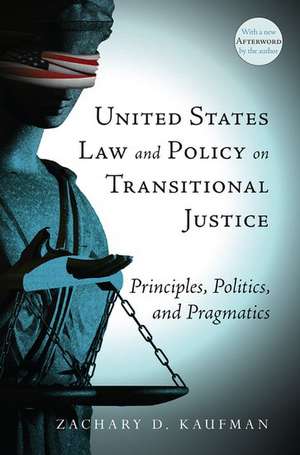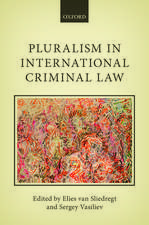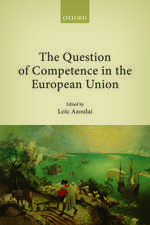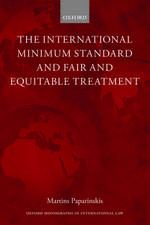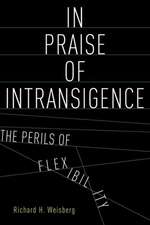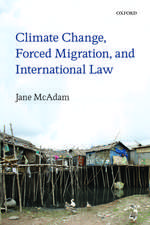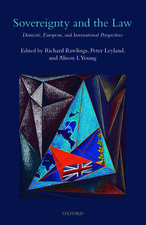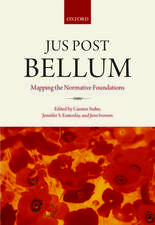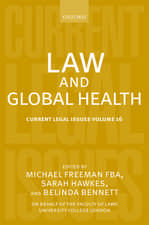United States Law and Policy on Transitional Justice: Principles, Politics, and Pragmatics
Autor Zachary D. Kaufmanen Limba Engleză Paperback – 9 mar 2017
| Toate formatele și edițiile | Preț | Express |
|---|---|---|
| Paperback (1) | 269.59 lei 10-17 zile | |
| Oxford University Press – 9 mar 2017 | 269.59 lei 10-17 zile | |
| Hardback (1) | 659.74 lei 31-38 zile | |
| Oxford University Press – 21 apr 2016 | 659.74 lei 31-38 zile |
Preț: 269.59 lei
Preț vechi: 316.13 lei
-15% Nou
Puncte Express: 404
Preț estimativ în valută:
51.58€ • 53.86$ • 42.69£
51.58€ • 53.86$ • 42.69£
Carte disponibilă
Livrare economică 03-10 martie
Preluare comenzi: 021 569.72.76
Specificații
ISBN-13: 9780190655488
ISBN-10: 0190655488
Pagini: 388
Dimensiuni: 231 x 155 x 23 mm
Greutate: 0.54 kg
Editura: Oxford University Press
Colecția OUP USA
Locul publicării:New York, United States
ISBN-10: 0190655488
Pagini: 388
Dimensiuni: 231 x 155 x 23 mm
Greutate: 0.54 kg
Editura: Oxford University Press
Colecția OUP USA
Locul publicării:New York, United States
Recenzii
Kaufman presents his cases in a highly systematic manner, with tight overall organization... Kaufman provides much useful insight... In evaluating the prudentialism and legalism models as ways to explain the United States' actions in the four primary cases, [Kaufman's] prudentialism emerges as a clear winner. Kaufman convincingly demonstrates that the United States in each [case] was open to multiple options and motivated by geo-political and other non-legal considerations.
Kaufman impressively uses an enormous amount of primary source data, including hundreds of previously classified [U.S. government] documents he obtained and elite interviews he conducted with key decision-makers... Kaufman's prudentialism framework is an essential new tool of analysis for scholars and practitioners of [transitional justice] specifically, and international relations generally, to understand why states support certain options in the aftermath of mass atrocities.
Kaufman's book is invaluable for those seeking to understand the legal structure of ICTs and why... This book is unique in the comparisons it affords of ICTs before and after the Cold War.
Kaufmans contribution to the academic literature should be perceived as a foundation in the study of both transitional justice and international relations. This book provides a compelling theoretical explanation of why some countries, particularly the United States, decide to, or not to, support particular transitional justice options.
In this strikingly original and meticulously researched book, Dr. Zachary Kaufman argues that the United States has led in the creation of some crucial international criminal tribunals for prudential reasons. The book provides essential insights for all interested in preventing mass atrocity, most importantly that war crimes tribunals have been and can be a prudent policy option for the United States.
Dr. Zachary Kaufman dissects, from the perspective of United States foreign policy, the design and establishment of four historic war crimes tribunals-Nuremberg, Tokyo, the former Yugoslavia, and Rwanda-and explains why they embodied uniquely crafted means of transitional justice. Kaufman's analytical premise for U.S. policy towards accountability for atrocity crimes is prudentialism, which he introduces as a blending of normative beliefs, politics, and pragmatics. Sometimes, however, that cocktail fails to result in a criminal tribunal, such as for Libya and Iraq following the end of the Cold War. Kaufman, a rising scholar, has written a tour de force that sets the stage for future tribunals and non-judicial approaches to transitional justice in a turbulent world.
Dr. Zachary Kaufman is an astute scholar and experienced practitioner on transitional justice issues. Through detailed, original research, he uncovers the factors driving U.S. policymaking on transitional justice. This important book-compellingly written, meticulously documented, and persuasively argued-is a must-read for anyone interested in international law, international relations, human rights, and U.S. foreign policy.
Why does the United States not consistently embrace prosecution for mass atrocities committed abroad? Dr. Zachary Kaufman has made a seminal contribution to this topic with this superbly well-documented and argued book. He improves our understanding of transitional justice, international governance, and U.S. foreign policy. The 2010 and 2015 U.S. National Security Strategies state that preventing mass atrocities is a responsibility that all nations share. Following in Kaufman's footsteps, we should seek to understand the transitional justice policies of China, India, Russia, and the one hundred liberal states parties to the International Criminal Court.
Dr. Zachary Kaufman is at the forefront of the transitional justice movement in the international sphere. His scholarship, his work experience with the U.S. government and three war crimes tribunals, and his personal philanthropy in Rwanda and elsewhere inform his new book, taking it out of the ivory tower and into the human and institutional wreckage left by crimes against humanity.
United States Law and Policy on Transitional Justice is a thought provoking study of postwar U.S. foreign policy concerning transitional justice, useful for students of diplomatic history, international law, and international relations alike. Dr. Zachary Kaufman examines U.S. support for international criminal tribunals and other transitional justice options to address atrocities abroad in the aftermath of World War II and the Cold War, arguing that U.S. policy is best explained by 'prudential factors' that mix law, pragmatism, and politics.
Dr. Zachary Kaufman's book makes an important contribution to our understanding of the how's and why's of America's transitional justice policies. His 'prudentialism' account of the making of U.S. transitional justice policies is deftly executed, backed up by substantial primary sources, and, ultimately, persuasive. A superb achievement.
In United States Law and Policy on Transitional Justice, Dr. Zachary Kaufman offers a historically-rich and nuanced account of how the U.S. government has addressed perpetrators of the most serious international crimes from 1945 up to the present day... At a time when both international organisations and national governments are trying to bring perpetrators of atrocity crimes to justice, and when the project of international criminal justice itself is under scrutiny, this book is an important resource for understanding the motivations and track record of U.S. law and policy.
Illuminating and trenchant, Dr. Zachary Kaufman's book takes us behind the scenes and sheds needed light on the high stakes policymaking guiding the U.S. role in transitional justice and humanitarian intervention.
Dr. Zachary Kaufman's original research and first-rate analysis deepen our understanding of the role played by the United States in establishing international criminal tribunals. His book casts new light on the interplay of politics, pragmatism, and the declared support for international norms in making the policy decisions to submit alleged perpetrators 'to the judgment of the law.'
This important, original, and unique contribution to the literature on transitional justice examines one of its foremost practitioners, the United States, starting with the post-Second World War context in Germany and Japan to the challenges of Yugoslavia, Rwanda, and the modern day. Profound new insights, of relevance to many parts of the world, emerge from such a compelling comparative approach.
In a world of recurrent barbarism, should perpetrators of atrocities be held accountable and, if so, how should they be brought to justice? In this thoughtful and impressively researched volume, Dr. Zachary Kaufman explores how American policymakers have sought to grapple with this vexing question. Kaufman provides a comprehensive analysis of transitional justice options and detailed analysis of six major cases, showing how politics and practical factors have shaped the impact of normative and legal considerations in American policy on transitional justice. This is an important argument, well made.
In a world that has accepted international criminal justice as law's predominant response to mass atrocity, Dr. Zachary Kaufman presents a valuable realist perspective on the factors, political and pragmatic, that influence state choices to pursue justice, via prosecutions, for the gravest episodes of abuse. Through succinct but well-documented and revealing accounts of U.S. decisions to support the key specialized international tribunals since World War II, this book analyzes considerations that affected those decisions and their inconsistencies and contradictions.
United States Law and Policy on Transitional Justice: Principles, Politics, and Pragmatics offers a magnificent and detailed examination of the domestic and international politics of international criminal tribunals, from Nuremberg and Tokyo to Arusha and The Hague. Dr. Zachary Kaufman shows that not only does the study of such tribunals and other transitional justice mechanisms belong in the realm of international relations, but it can also inform international relations theory itself.
An important contribution to our understanding of the politics of international criminal justice. Dr. Zachary Kaufman emphasizes the calculations that American leaders made about the costs and benefits of backing war crime tribunals in the aftermath of the Second World War. These same cost-benefit calculations have continued to shape America's choices in this increasingly prominent foreign policy domain.
Dr. Zachary Kaufman has provided an intricate examination of attempts to restore the rule of law after war and regime collapse. Selectivity of prosecutions, the loss of interest by sponsoring states, and the stubbornness of regime habits are all part of the problem that Dr. Kaufman tackles, in the hope of doing it better next time around.
Dr. Zachary Kaufman's excellent book highlights the United States' complicated role in legal approaches to transitional justice since the Second World War. The six cases in this book draw on unprecedented interviews with elite actors and documents unearthed through Freedom of Information Act requests. These materials highlight not only the profound influence of the United States in prosecuting atrocity perpetrators but also the impact of international justice on U.S. policymaking and practice. This book is a must-read for anyone who wants to understand why international criminal law persists today as a central component of transitional justice, despite major setbacks since Nuremberg and Tokyo, and the key role of the United States in encouraging international trials.
Dr. Zachary Kaufman pierces the legalist bubble that has dominated our understanding of U.S involvement in transitional justice globally. Highlighting the extensive deliberations about other options, like extrajudicial killings, and emphasizing the undeniably political factors driving pragmatic policymakers, Kaufman challenges those who would suggest that a normative commitment to justice was the defining factor in the American response to atrocities.
Kaufman impressively uses an enormous amount of primary source data, including hundreds of previously classified [U.S. government] documents he obtained and elite interviews he conducted with key decision-makers... Kaufman's prudentialism framework is an essential new tool of analysis for scholars and practitioners of [transitional justice] specifically, and international relations generally, to understand why states support certain options in the aftermath of mass atrocities.
Kaufman's book is invaluable for those seeking to understand the legal structure of ICTs and why... This book is unique in the comparisons it affords of ICTs before and after the Cold War.
Kaufmans contribution to the academic literature should be perceived as a foundation in the study of both transitional justice and international relations. This book provides a compelling theoretical explanation of why some countries, particularly the United States, decide to, or not to, support particular transitional justice options.
In this strikingly original and meticulously researched book, Dr. Zachary Kaufman argues that the United States has led in the creation of some crucial international criminal tribunals for prudential reasons. The book provides essential insights for all interested in preventing mass atrocity, most importantly that war crimes tribunals have been and can be a prudent policy option for the United States.
Dr. Zachary Kaufman dissects, from the perspective of United States foreign policy, the design and establishment of four historic war crimes tribunals-Nuremberg, Tokyo, the former Yugoslavia, and Rwanda-and explains why they embodied uniquely crafted means of transitional justice. Kaufman's analytical premise for U.S. policy towards accountability for atrocity crimes is prudentialism, which he introduces as a blending of normative beliefs, politics, and pragmatics. Sometimes, however, that cocktail fails to result in a criminal tribunal, such as for Libya and Iraq following the end of the Cold War. Kaufman, a rising scholar, has written a tour de force that sets the stage for future tribunals and non-judicial approaches to transitional justice in a turbulent world.
Dr. Zachary Kaufman is an astute scholar and experienced practitioner on transitional justice issues. Through detailed, original research, he uncovers the factors driving U.S. policymaking on transitional justice. This important book-compellingly written, meticulously documented, and persuasively argued-is a must-read for anyone interested in international law, international relations, human rights, and U.S. foreign policy.
Why does the United States not consistently embrace prosecution for mass atrocities committed abroad? Dr. Zachary Kaufman has made a seminal contribution to this topic with this superbly well-documented and argued book. He improves our understanding of transitional justice, international governance, and U.S. foreign policy. The 2010 and 2015 U.S. National Security Strategies state that preventing mass atrocities is a responsibility that all nations share. Following in Kaufman's footsteps, we should seek to understand the transitional justice policies of China, India, Russia, and the one hundred liberal states parties to the International Criminal Court.
Dr. Zachary Kaufman is at the forefront of the transitional justice movement in the international sphere. His scholarship, his work experience with the U.S. government and three war crimes tribunals, and his personal philanthropy in Rwanda and elsewhere inform his new book, taking it out of the ivory tower and into the human and institutional wreckage left by crimes against humanity.
United States Law and Policy on Transitional Justice is a thought provoking study of postwar U.S. foreign policy concerning transitional justice, useful for students of diplomatic history, international law, and international relations alike. Dr. Zachary Kaufman examines U.S. support for international criminal tribunals and other transitional justice options to address atrocities abroad in the aftermath of World War II and the Cold War, arguing that U.S. policy is best explained by 'prudential factors' that mix law, pragmatism, and politics.
Dr. Zachary Kaufman's book makes an important contribution to our understanding of the how's and why's of America's transitional justice policies. His 'prudentialism' account of the making of U.S. transitional justice policies is deftly executed, backed up by substantial primary sources, and, ultimately, persuasive. A superb achievement.
In United States Law and Policy on Transitional Justice, Dr. Zachary Kaufman offers a historically-rich and nuanced account of how the U.S. government has addressed perpetrators of the most serious international crimes from 1945 up to the present day... At a time when both international organisations and national governments are trying to bring perpetrators of atrocity crimes to justice, and when the project of international criminal justice itself is under scrutiny, this book is an important resource for understanding the motivations and track record of U.S. law and policy.
Illuminating and trenchant, Dr. Zachary Kaufman's book takes us behind the scenes and sheds needed light on the high stakes policymaking guiding the U.S. role in transitional justice and humanitarian intervention.
Dr. Zachary Kaufman's original research and first-rate analysis deepen our understanding of the role played by the United States in establishing international criminal tribunals. His book casts new light on the interplay of politics, pragmatism, and the declared support for international norms in making the policy decisions to submit alleged perpetrators 'to the judgment of the law.'
This important, original, and unique contribution to the literature on transitional justice examines one of its foremost practitioners, the United States, starting with the post-Second World War context in Germany and Japan to the challenges of Yugoslavia, Rwanda, and the modern day. Profound new insights, of relevance to many parts of the world, emerge from such a compelling comparative approach.
In a world of recurrent barbarism, should perpetrators of atrocities be held accountable and, if so, how should they be brought to justice? In this thoughtful and impressively researched volume, Dr. Zachary Kaufman explores how American policymakers have sought to grapple with this vexing question. Kaufman provides a comprehensive analysis of transitional justice options and detailed analysis of six major cases, showing how politics and practical factors have shaped the impact of normative and legal considerations in American policy on transitional justice. This is an important argument, well made.
In a world that has accepted international criminal justice as law's predominant response to mass atrocity, Dr. Zachary Kaufman presents a valuable realist perspective on the factors, political and pragmatic, that influence state choices to pursue justice, via prosecutions, for the gravest episodes of abuse. Through succinct but well-documented and revealing accounts of U.S. decisions to support the key specialized international tribunals since World War II, this book analyzes considerations that affected those decisions and their inconsistencies and contradictions.
United States Law and Policy on Transitional Justice: Principles, Politics, and Pragmatics offers a magnificent and detailed examination of the domestic and international politics of international criminal tribunals, from Nuremberg and Tokyo to Arusha and The Hague. Dr. Zachary Kaufman shows that not only does the study of such tribunals and other transitional justice mechanisms belong in the realm of international relations, but it can also inform international relations theory itself.
An important contribution to our understanding of the politics of international criminal justice. Dr. Zachary Kaufman emphasizes the calculations that American leaders made about the costs and benefits of backing war crime tribunals in the aftermath of the Second World War. These same cost-benefit calculations have continued to shape America's choices in this increasingly prominent foreign policy domain.
Dr. Zachary Kaufman has provided an intricate examination of attempts to restore the rule of law after war and regime collapse. Selectivity of prosecutions, the loss of interest by sponsoring states, and the stubbornness of regime habits are all part of the problem that Dr. Kaufman tackles, in the hope of doing it better next time around.
Dr. Zachary Kaufman's excellent book highlights the United States' complicated role in legal approaches to transitional justice since the Second World War. The six cases in this book draw on unprecedented interviews with elite actors and documents unearthed through Freedom of Information Act requests. These materials highlight not only the profound influence of the United States in prosecuting atrocity perpetrators but also the impact of international justice on U.S. policymaking and practice. This book is a must-read for anyone who wants to understand why international criminal law persists today as a central component of transitional justice, despite major setbacks since Nuremberg and Tokyo, and the key role of the United States in encouraging international trials.
Dr. Zachary Kaufman pierces the legalist bubble that has dominated our understanding of U.S involvement in transitional justice globally. Highlighting the extensive deliberations about other options, like extrajudicial killings, and emphasizing the undeniably political factors driving pragmatic policymakers, Kaufman challenges those who would suggest that a normative commitment to justice was the defining factor in the American response to atrocities.
Notă biografică
Zachary D. Kaufman J.D., Ph.D., is a Senior Fellow at the Harvard University John F. Kennedy School of Government as well as a Visiting Fellow at both Yale Law School and Yale University's Genocide Studies Program.Previously, Dr. Kaufman taught in Yale University's Department of Political Science and George Washington University's Elliott School of International Affairs, and he held fellowships, lectureships, or research positions at the U.S. Supreme Court, Yale Law School, Harvard Law School, Yale School of Management, Stanford University, and New York University. He also worked at the U.S. Department of Justice and was the first American to serve at the International Criminal Court.Dr. Kaufman is the editor of Social Entrepreneurship in the Age of Atrocities: Changing Our World (2012), the co-editor (with Dr. Phil Clark) of After Genocide: Transitional Justice, Post-conflict Reconstruction, and Reconciliation in Rwanda and Beyond (Oxford, 2009), and the author of dozens of articles and book chapters. A term member of the Council on Foreign Relations and a member of the International Institute for Strategic Studies, he holds a D.Phil. (Ph.D.) in International Relations from the University of Oxford (where he was a Marshall Scholar), a J.D. from Yale Law School (where he was an Olin Fellow and Editor-in-Chief of the Yale Law & Policy Review), and a B.A. in Political Science from Yale University (where he was the student body president).
